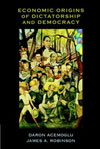A cemoglu and Robinson's recent book, Economic Origins of Dictatorship and Democracy is a major contribution to the understanding of democratisation and the endurance of democracy as a political institution.
Amidst the structural transformations that are occurring in Nepali politics today, it is a timely read for those interested in gaining insights into the mechanisms that underlie political change. Although the book is a general theory of democratisation, and the authors never mention Nepal (South Africa, Britain, Singapore and Argentina are cited) it provides a theoretical framework that can explain the history of Nepal's elusive quest for a consolidated democracy.
At the heart of the book is the distinction between 'democracy' and 'nondemocracy'. In a nondemocracy, policies reflect the interest of the rich 'elites', who are a minority, whereas in a democracy, policies reflect the interests of the majority of citizens, who are relatively poor.
Both democratic and nondemocratic governments seek to implement their preferred policies, but are constrained by external threats. The elites, when they are in power, are threatened by the possibility of revolution. The citizens, when they have power in a democracy, are threatened by the possibility that the elites will mount a coup.
Faced with such threats, democratic and nondemocratic regimes, if they are to survive, must make concessions. They can either offer to change policy, or to give up power. The problem with concessions through policy is that they may not be credible. In the threat of a revolution today, the elite will try to promise reform, but tomorrow, when the threat subsides, they will find it in their best interest to renege. In consideration of this, the revolutionaries, when they are strong, have no reason to accept promises of policy concession. They will demand more. They will demand that the political institutions be changed so that they can guarantee themselves favourable policies in the future as well. Democratisation is a way of making such guarantees.
Democratisation occurs when inequality is high so that the disenfranchised have incentives to contest power. However, since income gets lost and assets get damaged when a revolution occurs, it is possible that the gains from revolution may not be as high as the costs of it. When inequality is low, the citizens do not have much to gain by revolting, so a revolution will not be a threat. This is the case in Singapore, which is a relatively equal nondemocracy.
At higher levels of inequality, however, the citizens do have something to gain, so a revolution can take place and the elites will have to make credible concessions. This explains why the Ranas, the Panchayat and recently King Gyanendra conceded power. However, when inequality is extremely high, then again democratisation will not take place, because the rulers will find it less costly to repress a revolution than to make concessions.
In 1990, in order to prevent the monarch from using further repression, the democrats of Jana Andolan I struck a bargain with the king that although policies would be decided by parliament, the king could keep his crown and control of the army. The deal led to the institution of constitutional monarchy that we have had since then. Evidently, however, the citizens felt that too much was conceded, and their patience finally wore out this past April.
Not surprisingly, there is a belief among some critics that 'democracy failed in Nepal' and that alternative political institutions must be sought. The Maoists for instance have appealed to communism. One should be careful in making such arguments. As the Acemoglu-Robinson theory seems to imply, there are many types of democracies.
In fact, there is a continuum of types: from democracy that caters less to the citizens and more to the elites, gradually to that which caters more to the citizens and less to the elites. There are many ways to share power in democracy, and just because one type of democracy is not successful does not mean that democracy, in general, cannot work.

Economic Origins of Dictatorship
and Democracy
Daron Acemoglu and
James Robinson
2006, Cambridge University Press


